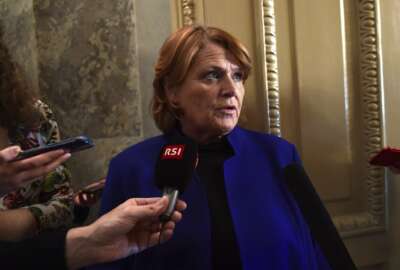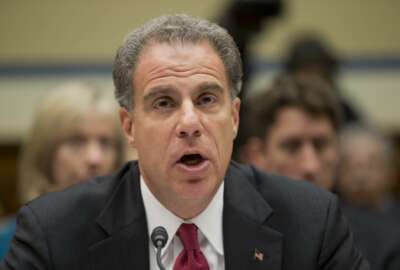
After 40 years, IGs, agency heads and Congress haven’t yet mastered balancing act
Some agency-inspector general relationships have drifted out of favor over the past 40 years. The IG community says it's time to swing the pendulum back.
Best listening experience is on Chrome, Firefox or Safari. Subscribe to Federal Drive’s daily audio interviews on Apple Podcasts or PodcastOne.
Inspectors general have a tricky balancing act to manage. Some IGs have mastered the art of both preserving their independence and serving as valuable management tools for their agency heads. Others have maintained their distance.
Four decades after President Jimmy Carter signed the Inspector General Act of 1978, IGs are still struggling with that balance.
“Being an inspector general and reporting to an agency is like being a … police [officer] or highway patrolman,” Arnie Fields, a former special inspector general for Afghanistan reconstruction, said July 9 at the Bipartisan Policy Center’s discussion on the IG Act anniversary. “You pull over your parent in the morning and you issue that parent for speeding. But in the evening, you sit at the dinner table and you have a normal conversation with your parent.”
The Bipartisan Policy Center was one of several organizations that, in light of the anniversary, examined the IG Act and its impact on the oversight community. The organization offered a series of recommendations and observations to Congress, the White House, agencies and the IG community itself in a new report.
Some agency-IG relationships have drifted in a more adversarial direction over the past 40 years, current and former inspectors general said.
But rather than taking that view, the IG community should instead consider taking a prominent role in helping their agencies resolve problems before they happen.
“Those management challenges need to be a thread through the work of the IG community, to identify core problems [and] root causes, that if corrected, will have an incredible impact upon the organization,” said Emilia Disanto, the State Department’s deputy IG.
Specifically, IGs should consider sharing draft versions of their reports with agency leaders before they’re published, the Bipartisan Policy Center said.
In the early days of the law, IGs initially focused almost entirely on preventing waste, fraud and abuse, said Denise Wilson, a former special assistant to the president in the White House’s Office of Legislative Affairs.
But today, IGs are also more intently focused on what Wilson described as the three “Es.”
The three “Es” “focus and better promote the economy, the efficiency and the effectiveness of the work that the IGs do toward improving agency operations and also to improve agency performance and through management improvements as well,” Wilson said. “We are … in addition to embracing the waste, fraud and abuse, also looking for ways to help agencies improve their operations by taking a look at lessons learned from IG audits and investigations. At the end of the day, that will move us toward a more evidence-based agenda, which … will also help [the] federal government improve.”
Former agency heads said they created a valuable working relationship with their IGs when they embraced them as a key part of the department’s operational success.
“You want to get ahead of a problem before it becomes explosive,” said John McHugh, a former Army secretary and congressman. “IGs can be an invaluable tool for that if they’re used wisely. Yes, they have to have their independence. But we tried to make our IG a regular part of the management team, just so they were very well aware of what was happening internally. They have an eye for the kinds of things that most agency heads don’t want to see happen.”
Former Agriculture Secretary Dan Glickman, who led USDA during most of the Clinton administration, said he spoke with his inspector general on one of his first days in office. The IG gave him a helpful update on the department’s programmatic and systematic challenges, and Glickman began inviting the inspector general to his cabinet meetings.
Better congressional relationships
Beyond communicating with agencies, IGs broadly need to improve their collaboration with Congress, the Bipartisan Policy Center said.
Beth Stein, oversight and investigative counsel for the minority staff on the Senate Health, Education, Labor and Pensions Committee, said she sees too many IGs who hide behind the charge of independence. They don’t proactively communicate with Congress or their agencies, and they only call when something is wrong.
“It’s not really the best way to do it,” she said. “I have one agency that asks for collaboration on their work plan. That is a very valuable model. [In] The other direction, when Congress has the IGs come in regularly to brief, not just the committee but maybe the legislative staff of the committee as a whole. You’re building those relationships in a valuable way.”
Disanto said her office sends a two-page update every month to a few hundred people, which include congressional staff members on State’s oversight and authorizing committees. The update details every report her office released that month, audits that have been started or closed and agency recommendations that are still open.
The State IG is also developing a virtual semi-annual report. IGs typically produce two major reports a year that summarize an agency’s major management issues. Disanto said her office is developing a virtual “semi-annual” report, which will keep the public and Congress updated on IG recommendations in close to real time.
New technology has certainly helped Disanto and her team be more proactive and transparent, but as many agencies struggle to update their IT and hire new personnel with a deep understanding of those systems, IGs face similar — if not greater — challenges.
“Data analytics is definitely where the focus needs to be,” Stein said. “But the IG needs to be pushing the agency. The agencies … are not doing enough to implement data analytics to determine their own risks, and when that can be a good collaboration, it can be very successful.”
Copyright © 2025 Federal News Network. All rights reserved. This website is not intended for users located within the European Economic Area.
Nicole Ogrysko is a reporter for Federal News Network focusing on the federal workforce and federal pay and benefits.
Follow @nogryskoWFED
Related Stories





